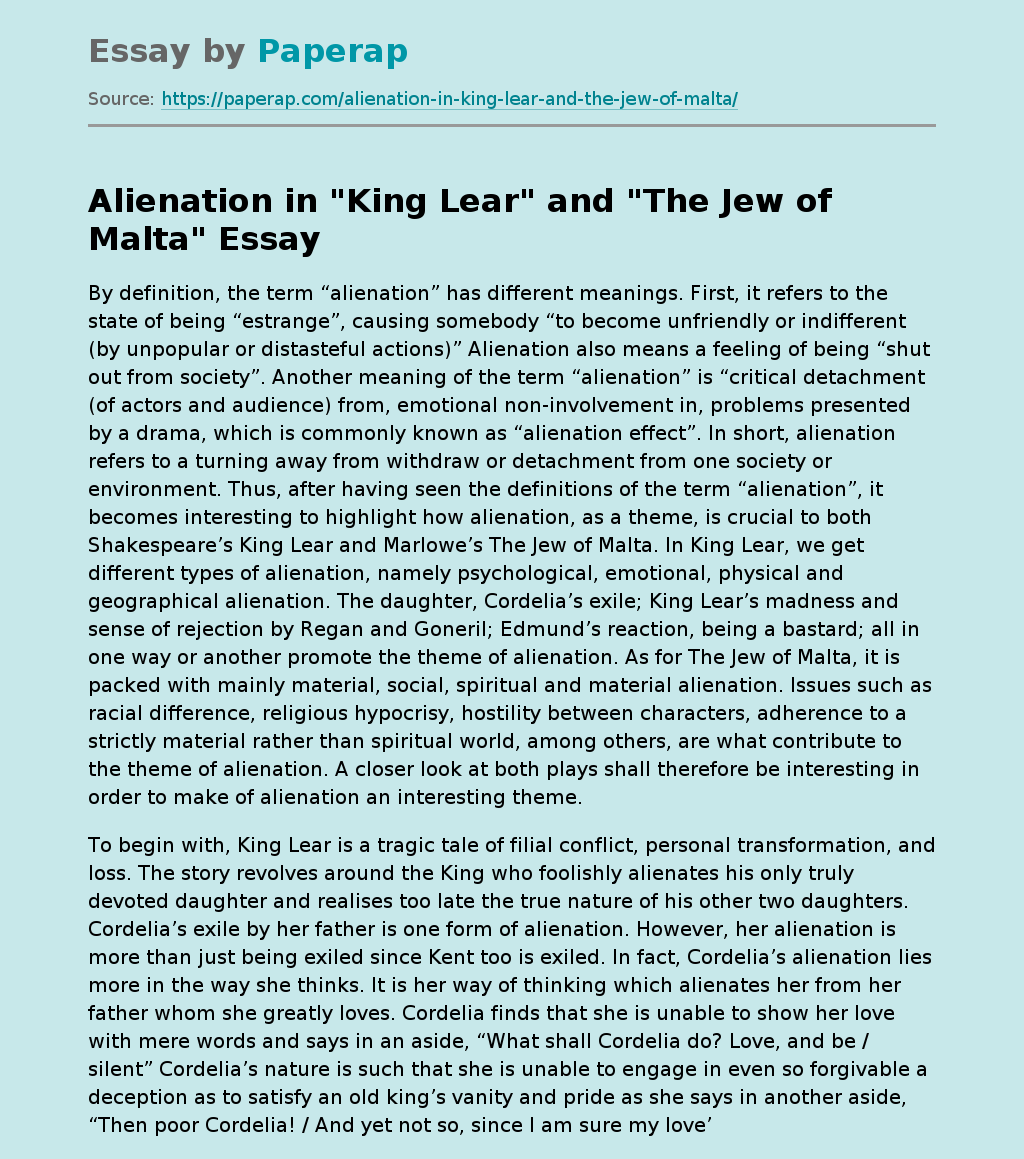The following sample essay on Alienation in “King Lear” and “The Jew of Malta”. By definition, the term “alienation” has different meanings. First, it refers to the state of being “estrange”, causing somebody “to become unfriendly or indifferent (by unpopular or distasteful actions)” Alienation also means a feeling of being “shut out from society”. Another meaning of the term “alienation” is “critical detachment (of actors and audience) from, emotional non-involvement in, problems presented by a drama, which is commonly known as “alienation effect”.
In short, alienation refers to a turning away from withdraw or detachment from one society or environment. Thus, after having seen the definitions of the term “alienation”, it becomes interesting to highlight how alienation, as a theme, is crucial to both Shakespeare’s King Lear and Marlowe’s The Jew of Malta.
In King Lear, we get different types of alienation, namely psychological, emotional, physical and geographical alienation. The daughter, Cordelia’s exile; King Lear’s madness and sense of rejection by Regan and Goneril; Edmund’s reaction, being a bastard; all in one way or another promote the theme of alienation.
As for The Jew of Malta, it is packed with mainly material, social, spiritual and material alienation. Issues such as racial difference, religious hypocrisy, hostility between characters, adherence to a strictly material rather than spiritual world, among others, are what contribute to the theme of alienation. A closer look at both plays shall therefore be interesting in order to make of alienation an interesting theme.
To begin with, King Lear is a tragic tale of filial conflict, personal transformation, and loss.
The story revolves around the King who foolishly alienates his only truly devoted daughter and realises too late the true nature of his other two daughters. Cordelia’s exile by her father is one form of alienation. However, her alienation is more than just being exiled since Kent too is exiled. In fact, Cordelia’s alienation lies more in the way she thinks. It is her way of thinking which alienates her from her father whom she greatly loves. Cordelia finds that she is unable to show her love with mere words and says in an aside, “What shall Cordelia do? Love, and be / silent” Cordelia’s nature is such that she is unable to engage in even so forgivable a deception as to satisfy an old king’s vanity and pride as she says in another aside, “Then poor Cordelia! / And yet not so, since I am sure my love’s / More richer than my tongue”.
Cordelia clearly loves her father, and yet realises that her honesty will not please him. Her nature is too good to allow even the slightest deviation from her morals. An impressive speech similar to her sisters’ would have prevented much tragedy, but Shakespeare has crafted Cordelia such that she could never consider such an act. We see Lear as a proud, vain, quick-tempered old king, not necessarily evil, but certainly not good. His folly leads to the alienation of his one truly loving daughter and the revelation that Regan and Goneril’s confession of love for him were mere empty words. Thus, Cordelia’s exile is not merely physical but also psychological. In other words, Cordelia’s alienation from her father is not merely physical and geographical. This alienation is more due to the way she thinks.
It is also interesting to note that the alienation of Cordelia from her father parallels the alienation of Edgar from Gloucester. Indeed, both Edgar and Cordelia are good children who love their fathers genuinely but who are both rejected by their respective fathers who are blind and who reject them in favour of children who do not love them and who want nothing but their wealth and power. When Gloucester says, “I never got him” – that is, he never begot, or fathered him – he seems to be denying that he is actually Edgar’s father, just as Lear has disowned Cordelia. This kind of alienation from the part of the fathers towards their good children is what inevitably makes the tragedy of the play unfold. In the case of Cordelia and Lear, had the latter not believed in appearance rather than reality, he would not have become such a miserable man and would not have been rejected in any way. His power would have remained intact since we guess that Cordelia would never have been able to go against his father due to her deep love for him. Similarly, had Gloucester not trusted the false words of his bastard son, Edmund, no such things as his blinding would have taken place.
Alienation in "King Lear" and "The Jew of Malta". (2019, Dec 05). Retrieved from https://paperap.com/alienation-in-king-lear-and-the-jew-of-malta/

